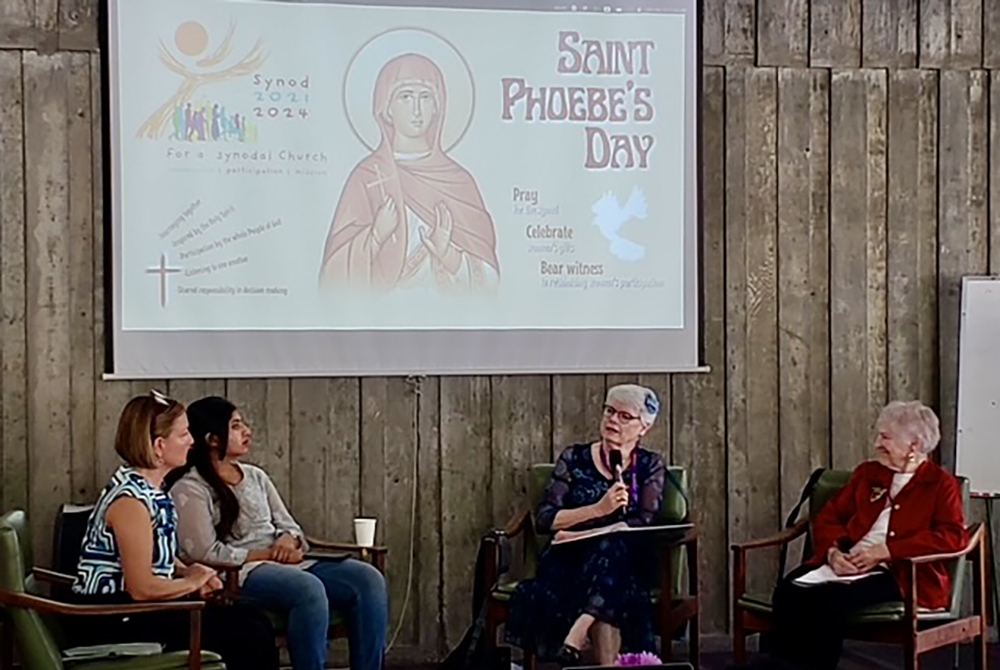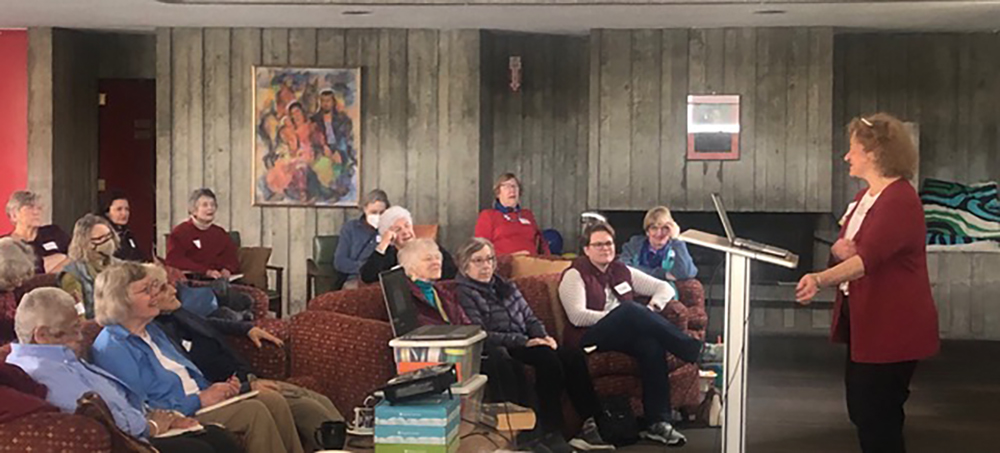
"Women in Conversation" participants discuss varied experiences on the role of women in the church for St. Phoebe's Day on Sept. 9, 2023. (Courtesy of Phoebe Qian)
"I am just at the edge of leaving the church," I have heard some Catholic women say. Perhaps they had too long anticipated the inclusion of women's leadership, gifts and ministries in the church. Others have already left.
We all look for wells to fill our longings. While theology and spirituality from women's perspectives has been sidelined in the U.S. Catholic church, a group of women in our parish has turned our situation into something generative and wondrous: "Women in Conversation."
In 2001, our bishop banned "the lay faithful" from giving homilies at Sunday's liturgy and leading communion services during the week, which lay persons — mostly women with graduate degrees in theology and divinity — had been offering since 1996.
Scholarship on feminist contributions in theology and Biblical studies had burgeoned after Vatican II (1962-65), which brought reforms to move the church into the modern world. We had seen doors open for women to share their gifts. But now several of us recognized that our parish no longer offered venues for women to explore theology, scripture or spirituality from women's perspectives, and had further silenced our voices from "breaking open the Word" at Eucharist.
We asked ourselves who would raise women's wisdom and voices, develop community and leadership among women parishioners, if not us?
We set to work.
Advertisement
In 2011 several of us organized women-only panels in the parish hall on such topics as "How I Sustain Myself as a Catholic Woman," "How Buddhism Augmented my Catholicism" and "My Spiritual Practices." We followed each session with lively small group conversations. There were about 25 of us at the time. We were getting to know one another.
Soon we were inviting women biblical scholars from the nearby Jesuit School of Theology in Berkeley. They drew back the curtain on stories, women or information in Scripture centered on texts which had been dismissed, erased or misinterpreted. Take for example, the story of Jesus meeting the woman of Samaria at the well (John 4:1-42). We had always heard that she was adulterous, having had six husbands.
Sr. Sandra Schneiders, a member of the Sisters, Servants of the Immaculate Heart of Mary of Monroe, Michigan and professor emerita of New Testament studies and Christian spirituality at Jesuit School of Theology at Santa Clara University, told us the story was not about an adulterer and that the "husbands" in the passage didn't refer to husbands at all. In fact, it would have been at the time impossible for a woman "to work her way" through five husbands without being stoned as an adulteress. In 720 BCE the Assyrians conquered Samaria, carrying captives into exile. When the Samarians returned to their territory in central Palestine, they brought back with them the cult of the five false gods of Assyria, Schneiders said, the "five husbands."
Schneiders asked why we hear homilies about the fishermen of Galilee who abandoned their boats and nets to follow Jesus, but we don't hear of this woman who left her water jar to tell the townsfolk, "Come and see. Could this not be the Messiah?," converting many to followers of Jesus (John 4:29). Schneiders' talk was a revelation.
At another session, Biblical and feminist scholar Gina Hens-Piazza pointed out that there are four gospel accounts of anonymous women washing Jesus' feet or anointing his head, and that translations and interpretations have made these women prostitutes. The practice of foot washing was originally an act of hospitality in Palestinian homes.
"We should not be surprised," she said, "that Jesus uses that familiar and well-known ritual — of hospitality, of comfort and of service — that had been manifested to him by these women in his last ditch effort to show the disciples what they have to do to be members of Jesus's community — especially after his death. 'If I who washed your feet — I who am Teacher and Lord — then you must wash each other's feet. What I just did was to give you an example; as I have done, so you must do' (John 13:14-15)."
Over the years, we women of Women in Conversation have formed strong friendships, accompanying one another on work projects, over a coffee, in illness and even in dying.
By 2013, when the lay people at the parish were told we could no longer even give a reflection at Mass, we already were creating a space to explore theology and spirituality from women's perspectives, and what we were discovering strengthened us.
"What 'Women in Conversation' really gives me is the friendship and love of sisters," one member said, "helping me through very lonely times as a woman in the Catholic Church. It has been a blessing to continue in the faith."
Another said there was also something important that had grown among ourselves — a sense of accompaniment. "I almost lost my faith, but because I spoke with one of you, and you heard me, I remain in the church,'' she said, "I realize in WIC we entrust one another with our faith journeys."
In 2013, we chose the name "Women in Conversation (WIC)" still limiting membership, to the continued consternation of many male parishioners. In time, we began to choose an annual theme, for example: Women Seeking the Sacred; From Who We are to Who we are Becoming; Finding Common Ground in Conflict; and Culture of Encounter: Midwives of Change.
One year when the theme was Dialoguing with the Other, we invited a practicing Muslim, Hina Khan-Muhktar.
"How would you describe your relationship with God?" our moderator asked.
"It is blessed, "Khan-Muhktar replied, engaging us immediately. "A constant feeling like I want to be closer to God, and trying to figure out what more I can do to bring myself closer to God. I am talking about God-consciousness, to keep God in my thoughts, in everything I do. In Arabic, everything is either male or female — even a sofa or a chair. But God," she said, "is beyond gender, beyond our comprehension." We realized we shared the same sense of the source of the Holy Mystery.

Gina Hens-Piazza presents on "Life Giving Encounters with Anonymous Biblical Women" on March 9, 2024. (Courtesy of Andrea Sessa)
During the COVID-19 pandemic, we met virtually for over a year, and now we meet both in person and online, some from across the country. Our bi-monthly Saturday morning sessions open and close with prayer and usually include a 45-minute presentation by an invited speaker, a break for coffee, conversation in small groups (facilitated also for participants on Zoom) and then Q&A with the speaker. We usually have 50-60 participants or more in person, plus those online. The presentations, not the conversations, are recorded and available on our website.
Over the 15 years since we began, we also feel we are filling in gaps in church offerings. We have learned from women of extraordinary faith, like undocumented mothers, an advocate for sex trafficked minors and a Catholic journalist and filmmaker. But sometimes we also take up teaching on vital issues outside gender that the local church appears to ignore, including those put forth by Pope Francis.
In 2015, for instance, Francis issued his landmark encyclical on caring for "our common home," Laudato Si'. We set out to inform ourselves on the crisis. We began with Franciscan Sr. Ilia Delio who spoke on the "big picture," the dialogue of emerging theology and science. We heard from Anne Symens-Bucher, founder of Canticle Faith in Oakland about the intergenerational, interracial and interfaith community working for food security through stewardship of an urban oasis. Molly Burhans, a cartographer, data scientist, environmental activist and founder of GoodLands, joined us in a live video from Rome to describe her extraordinary project of mapping all the assets of the Catholic Church and how the church might leverage the assets to address environmental destruction and mass human displacement. We asked ourselves what kind of ecological conversion we needed to make in our own lives.
Not hearing much on the synod in synodality process in our diocese or parish, we invited Deborah Rose-Milavec, then co-director of FutureChurch, who joined us just a week after the synod's first session to discuss "Women's Perspectives from the Synod in Rome."
Besides our Saturday morning presenters and conversations, women among us have created what you might call sacred spinoffs. Some of us organized reading groups on Laudato Si' and on Joanna Macy and Christine Johnstone's Active Hope. Three groups took up Playing God: American Catholic Bishops and the Far Right by Mary Jo McConahay and Elizabeth Liebert's The Way of Discernment: Spiritual Practices for Decision Making. Some of us started a bi-weekly lectio divina prayer group which has met for five years now; others are active in projects of the program called Just Faith, studying and acting on the church's witness to justice. Individuals interact with one another through our Google group, noting events, resources or possible calls to action.
Over the years, we women of Women in Conversation have formed strong friendships, accompanying one another on work projects, over a coffee, in illness and even in dying. Some members have left the church; others hang on by a thread. Women have joined from other Catholic parishes and from other Christian denominations. A core group remains active in the parish, trying to construct a more inclusive, vibrant church; some get a seat on the parish council or create events with other parishioners, like the recent liturgy and forum in honor of St. Phoebe, an early woman deacon in the church, for St. Phoebe's Day. For some, Women in Conversation has been a hospitable gathering to speak and listen with women of faith, and for others it has been an anchor holding them fast to the church. For all, Women in Conversation has become a beloved community, a place to recognize ways in which God breaks into our lives and to journey in our world with the living God.
As deep and rewarding an experience as Women in Conversation is, it is not a replacement for the kind of full inclusion of women's leadership, gifts and ministries of baptized women in the church. Rather, I share this as an example of hope; listening deeply to the Spirit, to one another, and to other women collaborating creatively at this moment in our history. We continue with a vision for the future.








